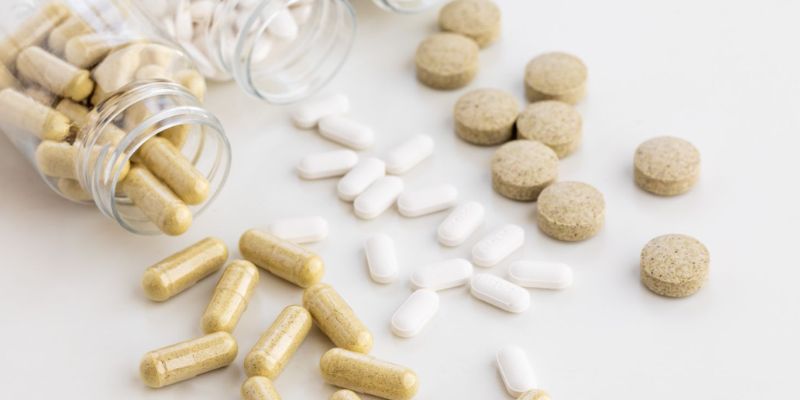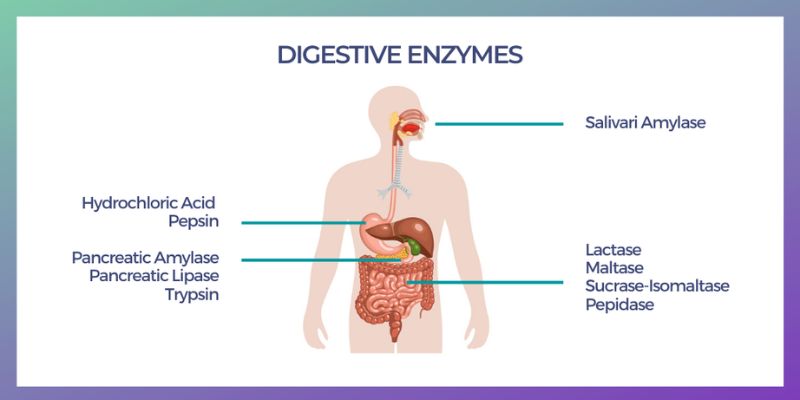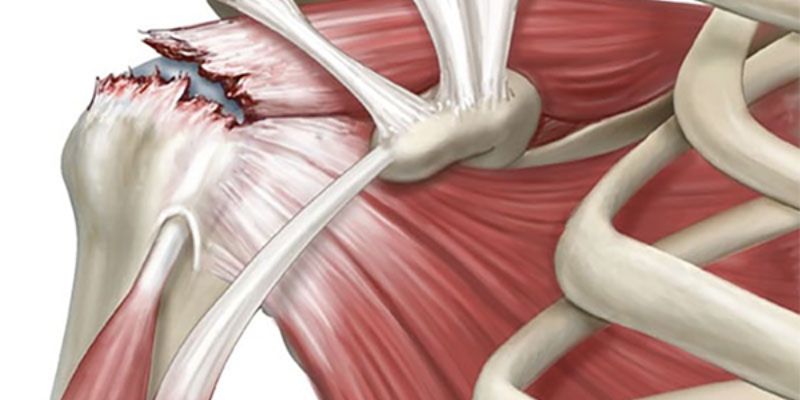What are Digestive Enzymes
Nov 23, 2023 By Nancy Miller
Do you ever feel like your digestive system isn't quite up to scratch? Do you get uncomfortable after eating high-fat or high-sugar foods? You may be lacking in digestive enzymes. But what are they, and how can they help your stomach work better?
This blog post will take a deeper look into the fascinating world of digestive enzymes -- what they are, how they work, and the different types available to support gut health. Read on to learn more about this important topic!
What Are Digestive Enzymes

Digestive enzymes are proteins that help to break down food so our bodies can absorb the nutrients. They allow us to digest carbohydrates, fats, and proteins more efficiently. Without them, our bodies would struggle to extract key vitamins and minerals from our food.
Types of Digestive Enzymes

Many types of digestive enzymes help support gut health. The three main types of digestive enzymes are:
- Amylase is one of the most important, as it helps to break down carbohydrates.
- Proteases, on the other hand, are responsible for breaking down proteins into amino acids.
- Lipases aid in the digestion of fats.
Other useful enzymes include lactase (which breaks down lactose) and cellulase (which helps break down plant cell walls). Together, these enzymes aid in the absorption of nutrients from food.
Sources of Digestive Enzymes
Digestive enzymes are essential for the breakdown and absorption of food nutrients in the gastrointestinal tract. Without them, our bodies would be unable to get the energy we need from what we eat. Fortunately, several sources of natural digestive enzymes can help us process our meals more efficiently.
Natural Sources of Digestive Enzymes
The body naturally produces most digestive enzymes, but certain fruits and vegetables contain them. For examples:
- Honey contains amylase and protease, which helps break down complex carbohydrates and starches in grains, beans, and starchy vegetables.
- Mango is another good source of amylase.
- Bananas have both amylase and lipase to aid digestion.
- Avocados also have lipase, which helps to break down fat.
- Sauerkraut is another great source of digestive enzymes due to its fermentation process.
Digestive Enzymes That Break Down Carbohydrates
The enzymes that help digest carbohydrates are:
- Amylase
- Lactase
- Maltase
- Sucrase
Amylase is produced in both saliva and the pancreas and helps to break down complex carbohydrates and starches found in grains, beans, and starchy vegetables. Lactase is made in the small intestine and breaks down lactose, a sugar found in dairy products.
Maltase is also made in saliva and the pancreas and helps break down maltose, a sugar in grains. Sucrase is made in the small intestine and breaks down sucrose and sugar in small amounts in fruits, nuts, and vegetables.
Digestive Enzymes That Break Down Proteins
The enzymes that help break down proteins are:
- Chymotrypsin
- Pepsin
- Peptidase
- Protease
The pancreas produces Chymotrypsin, while pepsin and peptidase come from both the stomach and pancreas. Protease is only made by the pancreas. All of these enzymes aid with the digestion of proteins found in food sources to provide energy for our bodies.
Additional Digestive Enzymes
Lipase and elastase help digest carbohydrates, fats, and proteins. Lipase is found in the pancreas, while elastase is produced in the pancreas and small intestine.
Plant-Derived Enzymes
Certain plants contain digestive enzymes as well. Bromelain from pineapple and papain from papaya both aid with the digestion of proteins. Eating these fruits can help make sure your digestive system is operating efficiently.
By now, you should better understand digestive enzymes, how they work, and where to find them naturally. Taking advantage of natural sources of digestive enzymes can be an effective way to support gut health and improve digestion.
What Are Digestive Enzymes Used For
Digestive enzymes are essential for our bodies to break down and absorb the nutrients we eat. Without them, the body could not pass on vital minerals and vitamins necessary for proper functioning.
While your body usually produces enough digestive enzymes to get the job done, sometimes it may need extra help. This is where over-the-counter (OTC) digestive enzyme supplements come in.
Autism Spectrum Disorders
Research into the use of digestive enzymes for addressing gastrointestinal issues in individuals with autism spectrum disorders (ASD) has produced mixed results. Although inconsistent, certain studies have noted improvements in emotional reactions, behaviors, and symptoms such as vomiting, selective eating, and abdominal discomfort linked to lactose intolerance. Further studies are necessary to substantiate these findings.
Cancer Treatment
Research indicates that over-the-counter digestive enzymes might enhance the quality of life for patients with colorectal cancer. Yet, more studies are essential to conclusively determine their efficacy in cancer treatment.
Celiac Disease
Investigations into whether enzymes like cysteine protease, prolyl endopeptidase, and Bacillus subtilis protease can manage celiac disease have shown some promising results. However, the safety and potential risks associated with these treatments must be carefully assessed.
Digestion of Fermentable Carbohydrates
Supplements containing alpha-galactosidase, such as Beano, may help those who struggle to digest certain carbohydrates found in foods like beans, potentially reducing symptoms like bloating and abdominal pain.
Functional Indigestion
Preliminary studies suggest that a multi-enzyme supplement including alpha-amylase, protease, cellulase, lactase, and lipase might alleviate symptoms of functional dyspepsia, though more comprehensive research is required for firm conclusions.
Inflammatory Bowel Disease
A small-scale study suggests that supplements containing beta-glucan, inositol, and digestive enzymes could enhance the life quality of individuals with inflammatory bowel disease (IBD).
Irritable Bowel Syndrome
Initial findings indicate that digestive enzymes may help alleviate symptoms of irritable bowel syndrome (IBS), but additional research is necessary to confirm these effects.
Lactose Malabsorption and Intolerance
Over-the-counter lactase supplements can aid those unable to digest dairy by preventing symptoms of indigestion. This may also benefit individuals with inflammatory bowel disease, celiac disease, or secondary lactose intolerance.
Muscle Aches and Pains
While some studies suggest that over-the-counter digestive enzymes may help relieve post-exercise muscle soreness, the evidence supporting their effectiveness remains to be more convincingly demonstrated.
Osteoarthritis
Several studies have explored the potential of enzymes such as rutin, trypsin, and bromelain to mitigate pain in osteoarthritis patients. More research is necessary to validate these effects.
Digestive Disorders Preventing Your Body From Making Enough Enzymes
• Poor diet, such as not getting enough fiber or processed foods
• Certain diseases, such as celiac disease or Crohn's Disease
• Age-related decline in digestive enzyme production
• Genetics that can affect the efficiency of enzyme production
• Stress, which can disrupt normal digestive processes
• Surgery on the digestive system, which can reduce the body's ability to produce enzymes.
Side Effects of Digestive Enzymes
- Diarrhea
- Upset Stomach
- Bloating
- Nausea
- Vomiting
- Flatulence
- Redness
- Swelling
- Trypsin
- Chymotrypsin
FAQs
Are probiotics the same as digestive enzymes?
No, probiotics and digestive enzymes are two different things. Probiotics are live microorganisms that help maintain the balance of bacteria in your gut, while digestive enzymes break down food to release nutrients into your body.
How do you know if you need digestive enzymes?
If you have symptoms of indigestion, such as bloating, cramping, or heartburn, it may be a sign that your body is not producing enough digestive enzymes. In these cases, taking an over-the-counter digestive enzyme supplement could help improve your digestion.
What is the best type of digestive enzyme to take?
The best type of digestive enzyme to take depends on the specific condition you want to treat. Always consult your doctor before taking any digestive enzyme supplement, as these can interact with certain medications and medical conditions.
Conclusion
Digestive enzymes play an essential role in breaking down and absorbing the nutrients we eat, but sometimes our bodies need extra help. Natural sources and over-the-counter supplements are available to improve digestion and gut health. Consult your doctor before taking any digestive enzyme supplement, as these can interact with certain medications and medical conditions. With appropriate treatment, you can enjoy optimal digestive health.
-
 Nov 18, 2023
Nov 18, 2023What Is Rotator Cuff Pain
Experiencing shoulder pain? Learn what rotator cuff pain is, why it occurs, and how to manage it with professional advice.
-
 Feb 25, 2024
Feb 25, 2024Benefits of Vitamin D3
Find out why Vitamin D3 is so important to our health and the incredible benefits it can provide. Learn how to get more of this essential nutrient in your diet.
-
 Oct 15, 2023
Oct 15, 2023Home Remedies for Yeast Infections
Suffering from a yeast infection? Try these natural treatments and home remedies to quickly relieve the itching, burning, and other symptoms. Learn how to adjust your diet and apply soothing items directly to the affected area for fast relief!
-
 Nov 17, 2023
Nov 17, 2023Benefits of Sea Buckthorn
Dive into this guide to better understand how sea buckthorn can help support your overall health and well-being. Learn about its anti-inflammatory properties, how it promotes skin health and more!
